Trudeau, Justin (1971-…), became prime minister of Canada on Nov. 4, 2015. Trudeau is the leader of the Liberal Party of Canada. He succeeded Conservative Prime Minister Stephen Harper. Trudeau has served as a member of Canada’s House of Commons since 2008. He represents the riding (electoral district) of Papineau, Quebec. He is a rare example of a celebrity in Canadian politics. Trudeau’s father, Pierre Elliott Trudeau, served as prime minister of Canada for most of the period from 1968 to 1984. He was also a Liberal.
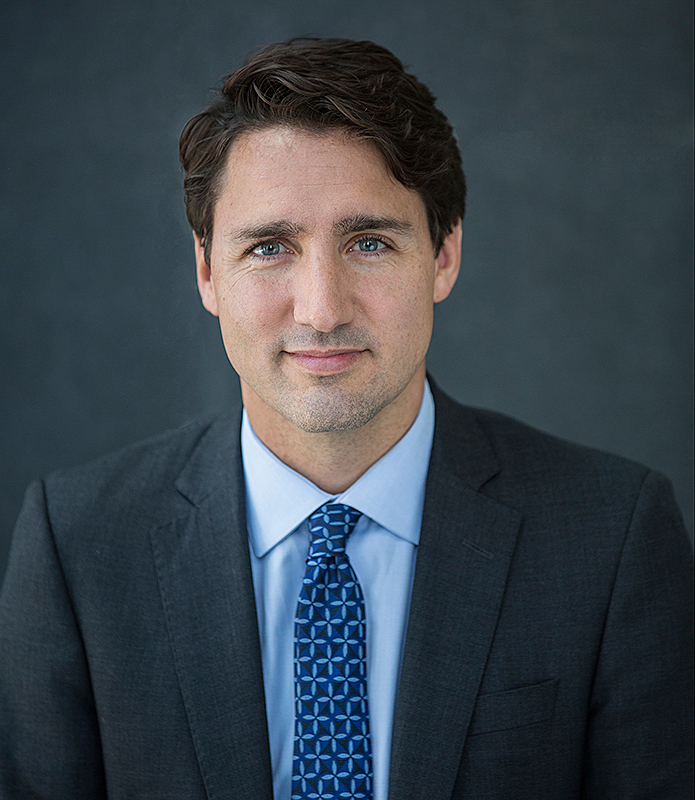
Early life
Childhood and family fame.
Justin Pierre James Trudeau was born on Dec. 25, 1971, in Ottawa, Ontario. He entered the public eye at birth. He was only the second child to be born to a sitting Canadian prime minister. The first, Mary Macdonald, daughter of Prime Minister John A. Macdonald, was born in 1869. The Trudeaus have been compared to the Kennedy family, a famous United States political family, owing to the strong public interest they have generated over the years.
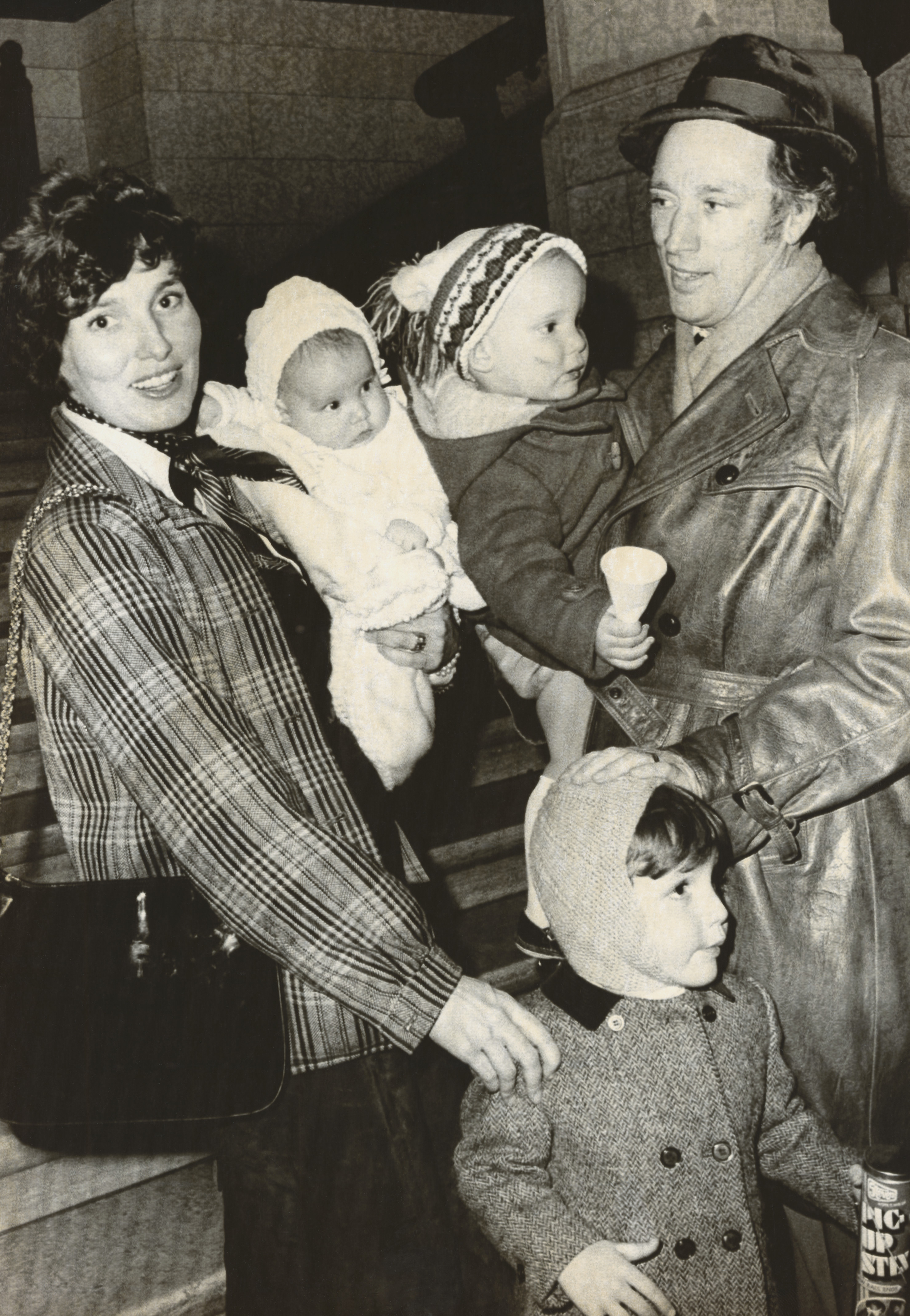
Justin Trudeau grew up in Ottawa. As the child of a prime minister, he traveled with his family to foreign capitals and met international leaders. When Pierre Trudeau retired from politics in 1984, the family moved to Montreal, Quebec. Justin attended high school at the Collège Jean-de-Brébeuf, a prestigious French-language school in Montreal.
In 1998, Justin’s youngest brother, Michel, was killed by an avalanche during a ski trip. Pierre Trudeau died in 2000 and was given a state funeral. Margaret Sinclair married Fried Kemper, a real estate developer, in 1984 and had two more children, Kyle and Alicia. Pierre Trudeau also had a daughter, Sarah, with lawyer Deborah Coyne.
Education and marriage.
Justin Trudeau received a B.A. degree in English literature from McGill University in 1994. He then spent about a year traveling in Europe, Africa, and Asia. He completed a B.Ed. degree from the University of British Columbia in 1998. In the early 2000’s, Trudeau also studied engineering at the University of Montreal’s Polytechnic School, and environmental geography at McGill. But he did not complete any more degrees.
In 2005, Trudeau married Sophie Grégoire, an entertainment journalist from Quebec. Trudeau and Grégoire have three children—Xavier, Ella-Grace, and Hadrien. The couple separated in 2023.
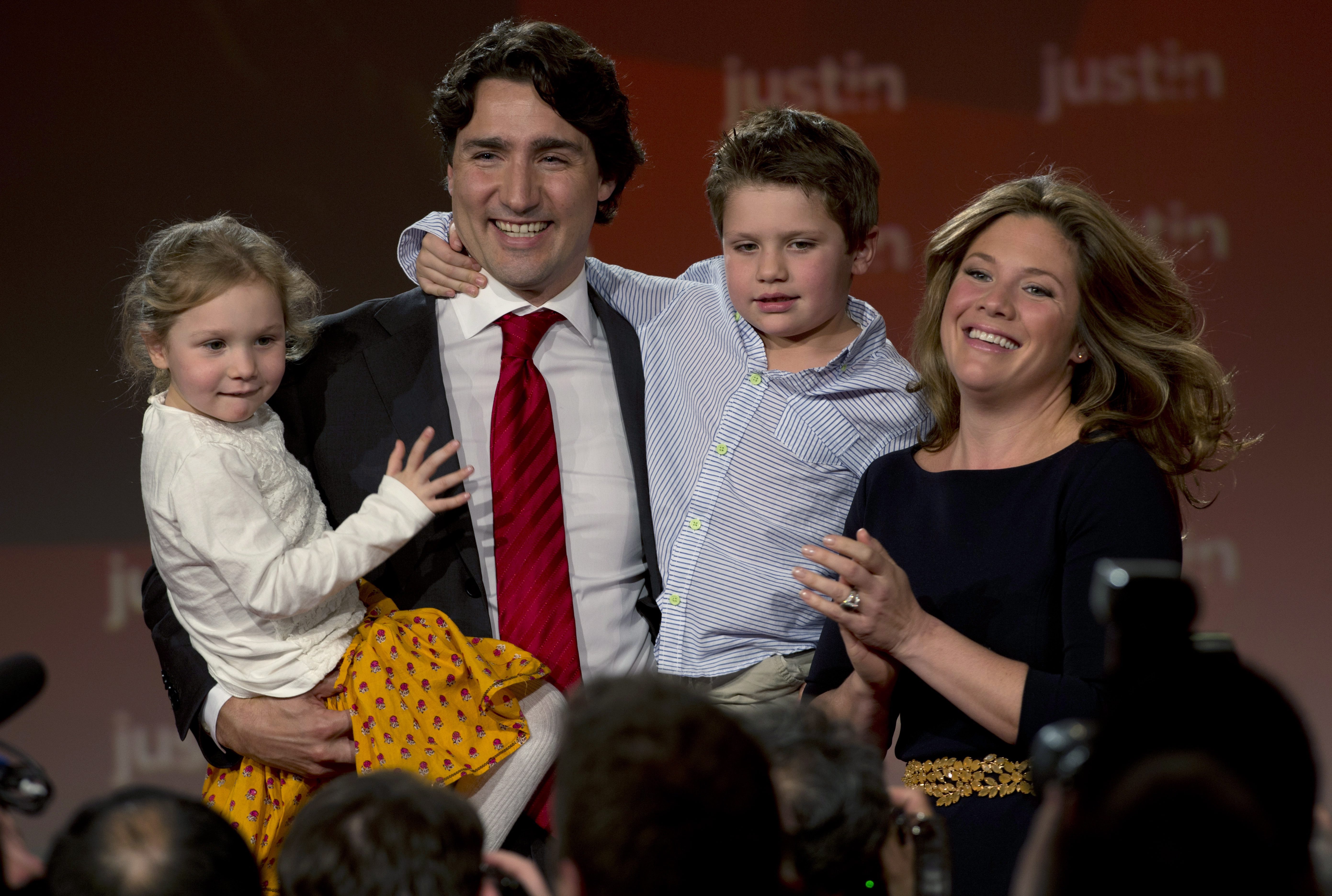
Employment.
As a young man, Trudeau held a variety of jobs, including nightclub doorman, whitewater river guide, snowboarding instructor, and camp counselor. From 1999 to 2002, he worked as a teacher at West Point Grey Academy and Sir Winston Churchill Secondary School, both in Vancouver, British Columbia. He taught several subjects, including drama, English, French, mathematics, and social studies.
After his brother Michel’s death in 1998, Trudeau became active in the Canadian Avalanche Foundation, a charity supporting public avalanche safety. He served as a foundation director from 2001 to 2008. From 2002 to 2006, Trudeau chaired Katimavik, a nonprofit organization providing volunteer opportunities for young people. In 2007, he played the role of a soldier in the Canadian Broadcasting Corporation television miniseries The Great War.
Political career
Early political activity.
After Trudeau delivered a stirring eulogy at his father’s state funeral in 2000, he was seen as a potential Liberal Party leader and prime minister. Initially, he kept a distance from politics. In 2006, Trudeau was appointed to chair a youth renewal task force to strengthen the Liberal Party. That same year, he was active in the party’s leadership convention. He supported a candidate who did not win.
Member of Parliament.
In the 2008 federal general election, the Conservative Party placed first and the Liberals, second. Trudeau was elected as a Liberal member of Parliament for the riding of Papineau, Quebec. Trudeau was reelected in 2011, but nationally the Liberals placed third for the first time, behind the Conservatives and the New Democratic Party (NDP). Previously, they always had placed first or second.
As a member of Parliament, Trudeau served as opposition critic in several areas, including immigration, multiculturalism, postsecondary education, sports, and youth. An opposition critic is a member of an opposition party who scrutinizes the actions of a particular government department. In March 2012, Trudeau defeated Conservative Senator Patrick Brazeau in a televised charity boxing match. Some people believed that Trudeau hoped the event would serve as a springboard for a bid to lead the Liberal Party.
Liberal Party leader.
In October 2012, Trudeau announced that he would seek the Liberal leadership. Many Liberals hoped he could restore their party’s popularity, which had declined in the early 2000’s. Trudeau’s campaign team signed up a large number of supporters, and he received endorsements from many Liberal MP’s. Trudeau was elected Liberal Party leader on April 14, 2013, with a large majority of the vote.
Historically, the Liberal Party has favored policies in the political center and has defended national unity. In general, Trudeau’s political values have been similar to his father’s. For example, he has supported the Canadian Charter of Rights and Freedoms—Canada’s bill of rights—and official bilingualism, both introduced into government by Pierre Trudeau. As Liberal leader, Justin Trudeau also supported abortion rights, the legalization of recreational marijuana, and antiterrorism legislation that expanded the powers of Canada’s domestic intelligence service. In 2014, Trudeau declared that Liberal senators would sit as independents, to make the Senate less partisan (loyal to a particular party). The Senate is appointed rather than elected. Also in 2014, Trudeau’s memoir Common Ground was published.
The 2015 election.
In August 2015, Prime Minister Harper asked the governor general to dissolve Parliament in preparation for an October general election. The 78-day election campaign was the longest since 1872. During the election campaign, the Liberals made many promises. They switched positions with the NDP on a number of issues by moving from the political center to the left. Unlike the Conservatives and the NDP, the Liberals pledged to run budget deficits, meaning the government would borrow money to support more spending. Throughout the campaign, Conservative advertising criticized Trudeau’s political inexperience. Nevertheless, on October 19, the Liberals won a majority of seats in Parliament, ending nearly a decade of Conservative government.
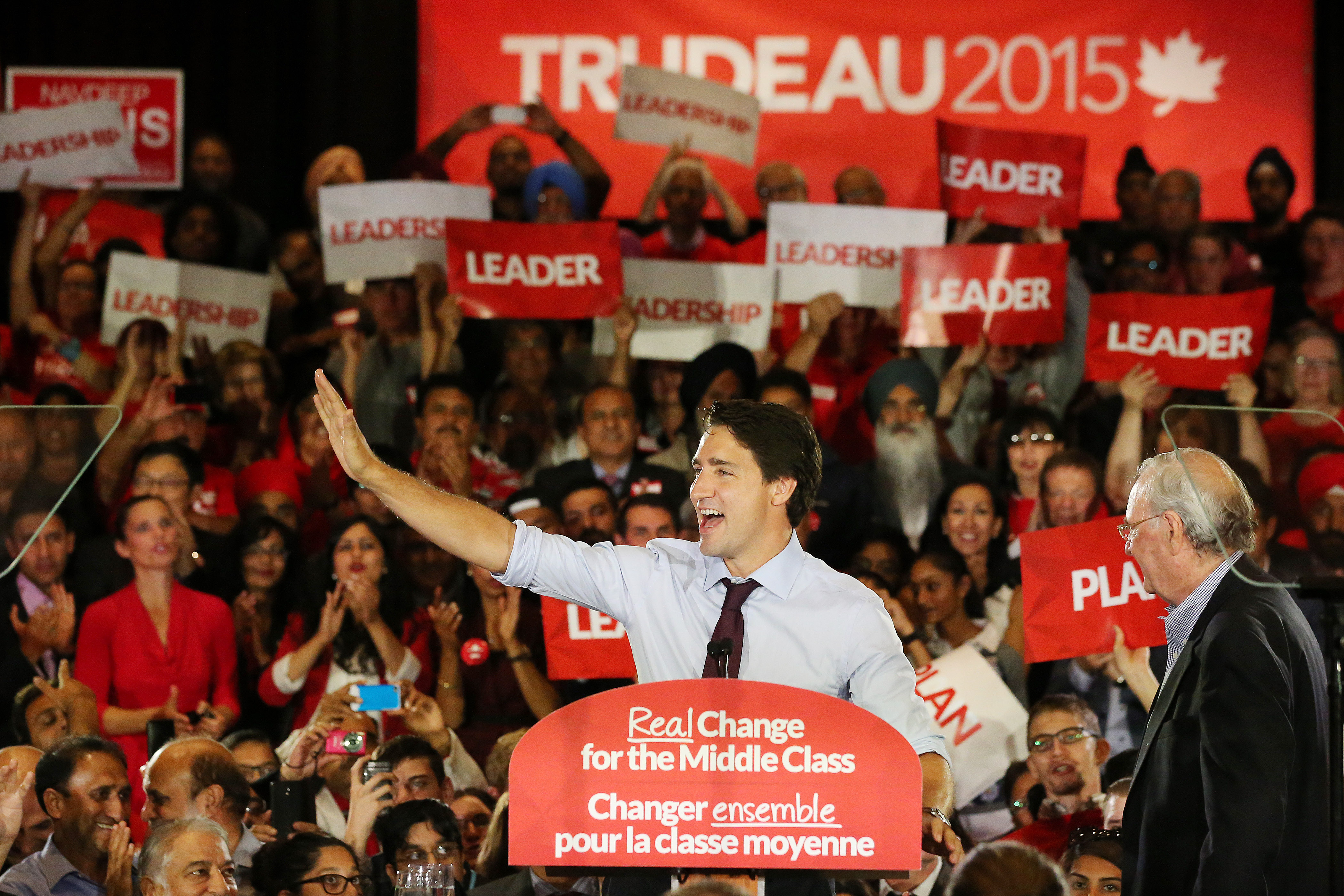
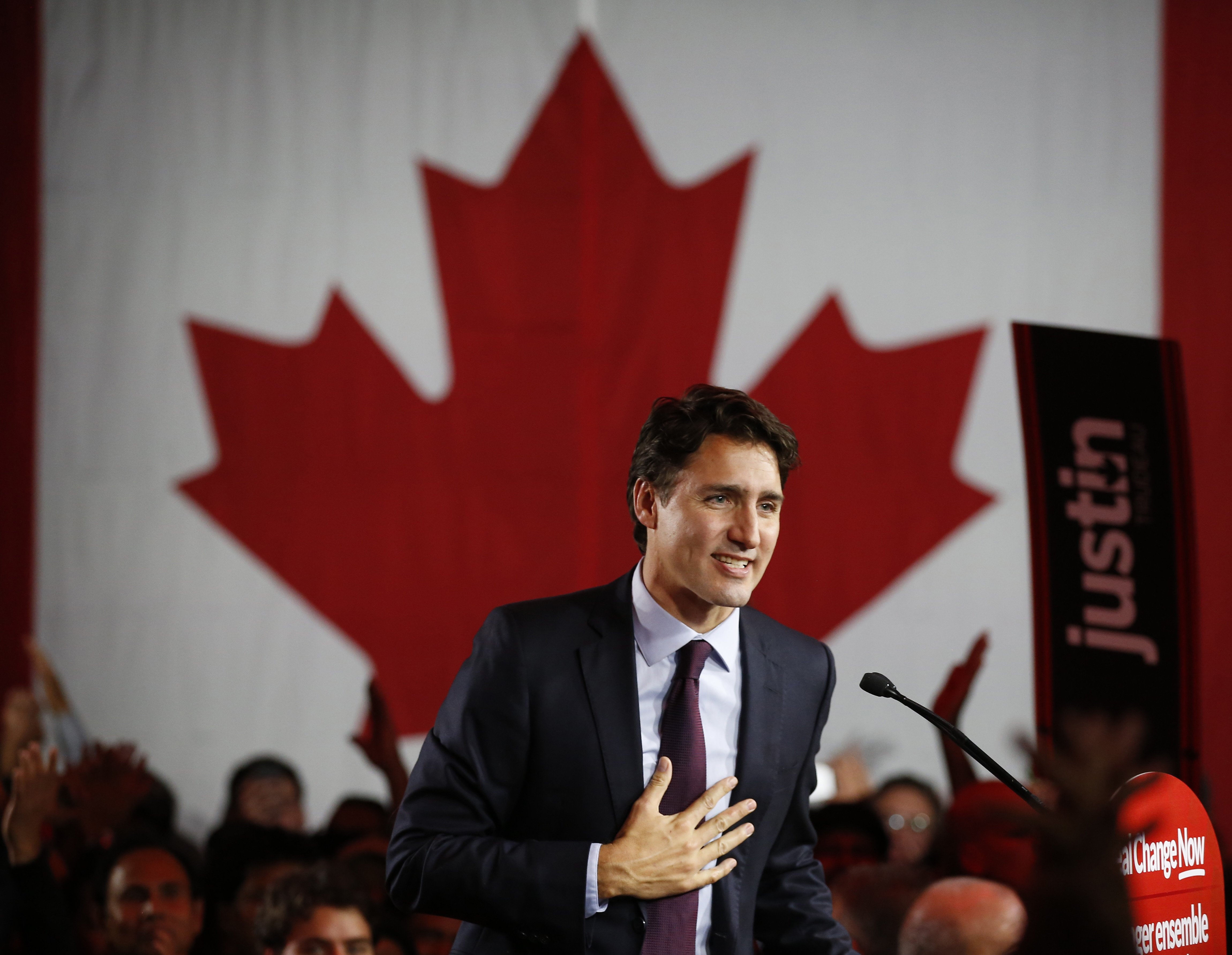
Prime minister.
Trudeau was sworn in as prime minister on Nov. 4, 2015. He became the first Canadian prime minister who was the child of a former prime minister. Additionally, Trudeau was the first prime minister to appoint a Cabinet in which half the ministers were women. Feminism (support for women’s rights) and gender equality became significant features of his government.
Trudeau’s family fame, his youth, and his good looks helped Canada attract international attention. At home and abroad, many people wanted to take photographs with Trudeau, and he earned the nickname “the selfie prime minister.” To avoid being viewed as part of the global elite (upper class), Trudeau eventually held a number of “town hall” meetings across Canada to answer questions from the public.
Policy.
The new Liberal government had an ambitious political agenda. It included mending relations with Canada’s Indigenous (native) people, many of whom had suffered injustices because of government policies. For example, during the 1800’s and 1900’s, many Indigenous children experienced abuse and neglect in Canada’s residential school system, created to integrate (incorporate) them into mainstream society. In December 2015, the government announced the creation of a National Inquiry into Missing and Murdered Indigenous Women and Girls.
In an effort to help the middle class, Trudeau’s government raised taxes on the wealthiest Canadians. It also provided monthly payments to parents of children under 18 years of age.
The government also passed legislation on a number of controversial issues. For example, in 2016, it legalized medically assisted death for some patients. And in 2018, Canada became the second country to legalize recreational marijuana, after Uruguay had done so in 2013.
In an effort to combat global warming, Trudeau’s government took actions to limit the transport of fossil fuels. In 2019, it also imposed a nationwide carbon tax—that is, a price levied on emissions of heat-trapping greenhouse gases—on businesses and consumers. However, the government’s purchase of the Trans Mountain Pipeline in 2018, and its approval of the pipeline’s expansion, drew criticism from environmentalists and Indigenous groups who claimed land around it. The pipeline carries oil from Alberta to Canada’s west coast.
Acting on a pledge to reform democratic institutions, Trudeau’s government in 2016 created an independent advisory board for Senate appointments. The board was formed to recommend Senate candidates to the prime minister based on their merit. However, the Liberals in 2017 abandoned a campaign promise to change the first-past-the-post system by which MP’s are elected. In this system, electors each vote for one candidate to represent their riding, and the candidate with the most votes wins.
In 2018, Trudeau, U.S. President Donald Trump, and Mexican President Enrique Peña Nieto signed an updated version of the North American Free Trade Agreement (NAFTA), which replaced NAFTA in 2020. In Canada, the new pact was called the Canada-United States-Mexico Agreement (CUSMA). It maintained the largely tariff-free trade zone created by NAFTA, and introduced new obligations covering such areas as e-commerce, the environment, and labor practices.
Ethics violations.
Trudeau’s public image changed over time as his government made controversial decisions, and as he personally became involved in controversies. On two occasions, Canada’s ethics commissioner found that Trudeau had violated federal ethics rules. The first violation occurred in 2016, when Trudeau accepted a trip to vacation on an island owned by the Aga Khan, a spiritual leader who had business dealings with Canada’s government.
In 2019, the ethics commissioner found that Trudeau and his staff had improperly tried to influence Canada’s attorney general in an ongoing criminal case against the Quebec construction company SNC-Lavalin. The SNC-Lavalin affair resulted in the resignation of two Cabinet ministers, including the attorney general; Trudeau’s principal secretary; and the clerk of the Privy Council, the government’s most senior bureaucrat. The resignation of the attorney general, Jody Wilson-Raybould, an Indigenous woman, was an especially sensitive issue for the Liberals, given their commitment to feminism and to reconciliation with Indigenous peoples.
Elections of 2019 and 2021.
The Liberals won the next general election, held on Oct. 21, 2019. They won the most, but not a majority of, seats in the House of Commons and formed a minority government. Throughout Trudeau’s second term as prime minister, the government coped with the effects of COVID-19, an infectious disease that spread around the world.
In August 2021, Trudeau asked Governor General Mary Simon to dissolve Parliament so that a general election could be held on September 20, two years earlier than required. At the time, it appeared that the Liberals were in a good position to regain their majority in the House of Commons. However, they won the election with a minority. Trudeau remained prime minister.
